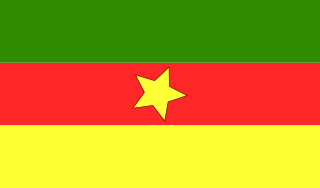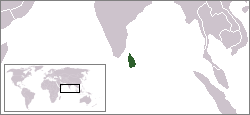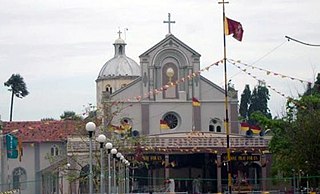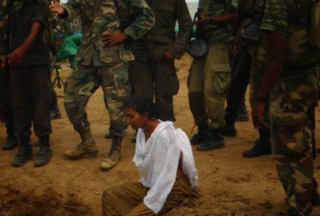Related Research Articles

The Special Task Force (STF) (Sinhala: විශේෂ කාර්ය බලකාය Visesha Karya Balakaya; Tamil: சிறப்பு அதிரடிப் படை) is the tier one police tactical unit of the Sri Lanka Police specialising in anti-irregular military, apprehension of armed and dangerous criminals, clandestine and covert operations, combat and patrolling in urban areas, counterterrorism and hostage rescue crisis managements, crowd control, executive protection, high-risk tactical law enforcement situations, indirect fire for support operations, irregular warfare, operating in difficult to access terrain, protecting high-level meeting areas, search and rescue people who are in distress or imminent danger from disaster, support crowd control and riot control, tactical special operations, and other tasks requiring special training. It was formed in 1983 not as a military force, but rather as a highly specialised armed police unit.

The Eelam People's Democratic Party (EPDP) is a Sri Lankan political party and a pro-government paramilitary organization. It is led by its founder Douglas Devananda.

The 1987–1989 JVP insurrection, also known as the 1988–1989 revolt or the JVP troubles, was an armed revolt in Sri Lanka, led by the Marxist–Leninist Janatha Vimukthi Peramuna, against the Government of Sri Lanka. The insurrection, like the previous one in 1971, was unsuccessful. The main phase of the insurrection was a low-intensity conflict that lasted from April 1987 to December 1989. The insurgents led by the JVP resorted to subversion, assassinations, raids, and attacks on military and civilian targets while the Sri Lankan government reacted through counter-insurgency operations to suppress the revolt.
Krishanti Kumaraswamy, also spelled Krishanthi Kumaraswamy, was a Tamil woman in Sri Lanka who was raped and murdered on 7 September 1996 by six Sri Lankan Army soldiers; the effort to bring her assailants to justice became a cause célèbre as a part of the protest against atrocities committed by the Sri Lankan Army during the Sri Lankan Civil War.
Human rights in Sri Lanka provides for fundamental rights in the country. The Sri Lanka Constitution states that every person is entitled to freedom of thought, conscience and religion, including the freedom to have or to adopt a religion or belief of his choice. And, that every person is equal before the law.
Sri Lankan Tamil militant groups rose to prominence in the 1970s to fight the state of Sri Lanka in order to create an independent Tamil Eelam in the north of Sri Lanka. They rose in response to the perception among minority Sri Lankan Tamils that the state was preferring the majority Sinhalese for educational opportunities and government jobs. By the end of 1987, the militants had fought not only the Sri Lankan security forces but also the Indian Peace Keeping Force. They also fought among each other briefly, with the main Liberation Tigers of Tamil Eelam (LTTE) rebel group dominating the others. The militants represented inter-generational tensions, as well as the caste and ideological differences. Except for the LTTE, many of the remaining organizations have morphed into minor political parties within the Tamil National Alliance, or as standalone political parties. Some Tamil militant groups also functioned as paramilitaries within the Sri Lankan military against separatist militants.

The 1977 anti-Tamil pogrom in Sri Lanka followed the 1977 general elections in Sri Lanka where the Sri Lankan Tamil nationalistic Tamil United Liberation Front won a plurality of minority Sri Lankan Tamil votes. In the elections, the party stood for secession. An official government estimate put the death toll at 125, whereas other sources estimate that around 300 Tamils were killed by Sinhalese mobs. Human rights groups, such as the UTHR-J, accused the newly elected UNP-led government of orchestrating the violence.

The Vankalai massacre was a massacre of a family of four minority Sri Lankan Tamils at the hands of the Sri Lankan military personnel from the village of Vankalai in Mannar District, Sri Lanka on June 8, 2006. The victims were tortured and the mother was gang raped before her murder.

Nadarajah Raviraj was a Sri Lankan Tamil lawyer and politician who served as Mayor of Jaffna in 2001 and a Member of Parliament for Jaffna District from 2001 to 2006. A member of the Tamil National Alliance, he was shot dead on 10 November 2006 in Colombo.
Mirusuvil massacre refers to the massacre and subsequent mass burial of eight Sri Lankan Tamil civilians on 20 December 2000.
Ida Carmelitta or Farheen Ida Carmelitta Laila Figerardo was a minority Sri Lankan Tamil woman who was gang raped and killed on 12 July 1999 and became a cause célèbre of the Sri Lankan civil war.

Eelam War II is the name given to the second phase of armed conflict between Sri Lankan military and the separatist Liberation Tigers of Tamil Eelam. The war started after the failure of peace talks between the Premadasa government and the LTTE. This phase of the war was initiated by the LTTE who massacred almost 600 Sinhalese and Muslim police personnel after they were ordered by the Premadasa government to surrender to the LTTE. The truce was broken on June 10, 1990, when the LTTE in October expelled all the 28,000 Muslims residing in Jaffna.

Sarathambal Saravanbavananthatkurukal or better known as Sarathambal was a minority Sri Lankan Tamil woman who was gang raped and killed on 28 December 1999. This became an internationally known incident of the Sri Lankan Civil War.
Murugesapillai Koneswary or Koneswary Murugesapillai was a minority Sri Lankan Tamil woman who was raped and killed on 17 May 1997 as part of the ongoing Sri Lankan civil war. The rape and murder received extensive local and international attention.
Sudar Oli is a Tamil language Sri Lankan daily newspaper published by Mass Media Syndicate (Private) Limited, part of the Uthayan Group of Newspapers. It was founded in 2000 and is published from Colombo. Its sister newspaper is the Jaffna based Uthayan. The newspaper has been attacked several times, a number of its staff have been murdered by paramilitary groups and other forces, and it regularly receives threats.
Selvarajah Yogachandran, also known as Kuttimani was one of the leaders of the former Tamil militant organization TELO from Sri Lanka. He was arrested and sentenced to death, and was killed in the 1983 Welikada prison massacre along with the other TELO leader Nadarajah Thangathurai.
The Lessons Learnt and Reconciliation Commission was a commission of inquiry appointed by Sri Lankan President Mahinda Rajapaksa in May 2010 after the 26-year-long civil war in Sri Lanka to function as a Truth and reconciliation commission. The commission was mandated to investigate the facts and circumstances which led to the failure of the ceasefire agreement made operational on 27 February 2002, the lessons that should be learnt from those events and the institutional, administrative and legislative measures which need to be taken in order to prevent any recurrence of such concerns in the future, and to promote further national unity and reconciliation among all communities. After an 18-month inquiry, the commission submitted its report to the President on 15 November 2011. The report was made public on 16 December 2011, after being tabled in the parliament.

Shoba, also known as Shobana Dharmaraja, was a Sri Lankan Tamil journalist and television broadcaster for the rebel Liberation Tigers of Tamil Eelam (LTTE). She died in the final days of the Sri Lankan Civil War in 2009 with video evidence that she was captured by the Sri Lankan military before being raped, tortured and murdered. A senior United Nations official deemed the footage to be authentic. Amnesty International and Human Rights Watch also verified that it was her.
Events from the year 2014 in Sri Lanka.
Sexual violence against Tamils in Sri Lanka has occurred repeatedly during the island's long ethnic conflict. The first instances of rape of Tamil women by Sinhalese mobs were documented during the 1958 anti-Tamil pogrom. This continued in the 1960s with the deployment of the Sri Lankan Army in Jaffna, who were reported to have molested and occasionally raped Tamil women.
References
- ↑ Sri Lanka: Rape in custody | Amnesty International [ permanent dead link ]
- ↑ State Violence in Sri Lanka Archived September 27, 2007, at the Wayback Machine
- 1 2 3 4 5 6 7 2003 Report by the Special Rapporteur
- ↑ OMCT Sri Lanka Report Archived September 27, 2007, at the Wayback Machine
- 1 2 Amnesty International:Rape in Custody (28 January 2002)